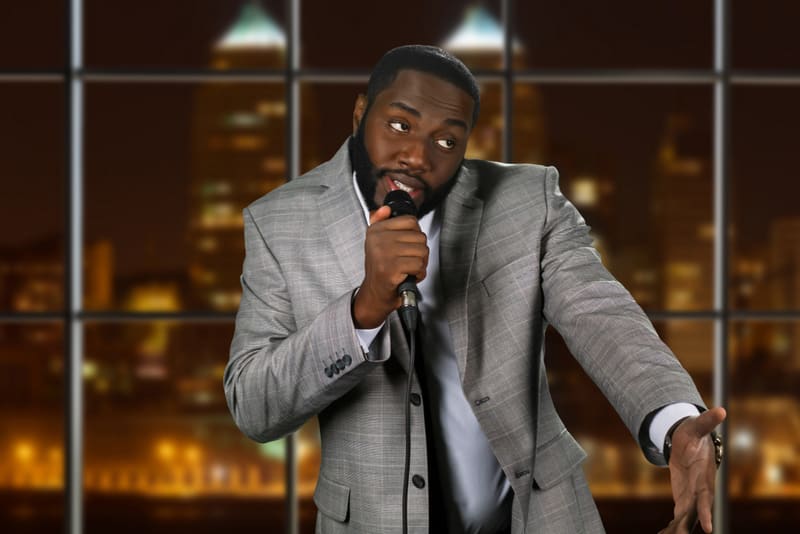Four Things You Need to Know About Making a Career in Comedy
While Donald Trump may not be tuning in, Saturday Night Live is basking in its highest ratings in more than 20 years. From Melissa McCarthy as White House Press Secretary Sean “Spicey” Spicer to Kate McKinnon as Jeff Sessions as Forrest Gump, the show is on a roll and shows no signs of stopping anytime soon -- or at least for the next four years, anyway.
- Student Tips

While Donald Trump may not be tuning in, Saturday Night Live is basking in its highest ratings in more than 20 years. From Melissa McCarthy as White House Press Secretary Sean “Spicey” Spicer to Kate McKinnon as Jeff Sessions as Forrest Gump, the show is on a roll and shows no signs of stopping anytime soon -- or at least for the next four years, anyway.
So even if Alec Baldwin just revealed that he may soon be stepping down from portraying the lampooned president, the future -- at least when it comes to comedy careers -- looks bright. If you’re thinking of trying to break into this notoriously competitive field, here are four things you need to know.

1. You don’t need a degree in the field.
Degrees in comedy are few and far between. And while the value of programs like the University of Kent’s MA in Stand Up Comedy is undeniable (any working comedian will tell you that practice makes perfect), there are also plenty of ways to get the experience you need on and around campus. In fact, taking different coursework -- for example, political science studies -- can give you upper-level insights….and plenty of fresh material.
But even if you don’t do any of these things in college, you can still pursue a career in comedy. Rodney Dangerfield, Ricky Gervais, Phyllis Diller, Larry David and Lisa Lampanelli are just a few examples of famous comedians who started late.

2. Extracurriculars can pave the path.
Joining a college sketch group, taking an improv class, and attending comedy performances can all help you start creating and honing your craft. If your college doesn’t have a sketch or improv group, consider starting your own. In addition to building your skills amidst like-minded comedy lovers, you’ll also score extra points for leadership.
An added bonus? As Matt Lappin, segment producer on Comedy Central’s “The Colbert Report” and “Strangers with Candy” writer, told Writer’s Digest, “Getting noticed is a bit of a crapshoot. A lot of it is being in the right place at the right time.” The takeaway? Because there is an element of luck when it comes to getting discovered, the more you put yourself out there, the more your work will be seen, heard and eventually noticed.

3. Critical thinking and writing skills matter.
According to the website Creative Stand Up, a flexible range of writing skills is essential to a successful standup career. Also imperative? The ability to think critically, and write well. Creative writing courses are a great place to start, especially if they’re geared towards comedy like the Writing and Producing Comedy course offered by NFTS.
According to humorist Mary Hirsch, “Humor is a rubber sword – it allows you to make a point without drawing blood.” The best comedy isn’t just funny. It also serves a higher purpose in becoming social commentary that makes people think. A recent piece published on the website Humanity in Action highlights the role comedy plays in “holding up a mirror and forcing us to confront realities that we would often prefer to ignore.”
This is evidenced no more clearly than Octavia Spencer’s recent opening SNL monologue about the confusion between her award-winning movie Hidden Figures and two other films, Fences and Moonlight: "So many people have been coming up to me saying, 'I loved Hidden Fences!' ... I get it, there were three black movies at the Oscars this year. And that's a lot for Americans. So if you're going to get confused anyway, I thought I might as well make some money off it. That's why I produced Hidden Fence Light."
While these kinds of jokes may seem breezy and off the cuff, this type of comedy writing is actually an intensive and reflective act. Consider this explanation of joke-writing from The Science PT podcast: “Many jokes are based on observational humor. The first thing a comic will do is make observations about the world around them and common life experiences....Then they will examine one of those observations and think about the common ways that most people intuitively interpret that observation (the more universal the better)....At this point the comic must look for alternative interpretations that no one else has considered but are just as true, if not more so...The more the alternative interpretation is unintuitive yet true, the funnier it is.”

4. A writing buddy will make you better.
Many working comedians swear by the value of collaboration. As Comedy Workshop Productions president Judy Carter said in an interview with Experience, “People who just write material at a computer sound too literary. You want to create material in the presence of another human being, so you can see it on his face when he's bored.”
Former staff writer for “Late Night with Conan O’Brien” and multiple Writer’s Guild Award winner and Emmy nominee Roy Jenkins echoed the sentiment, telling Writer’s Digest, “When you’re writing around a table, you hope you’re not in an environment that’s totally competitive; that you’re all pulling on the same oar. There’s always going to be an element of competitiveness. When it’s friendly, it’s fun. The idea is to go back and forth to the point where it’s hard to say who came up with what in the script. Everybody pushed and pulled it. That’s the best, when nobody is keeping score. You’re just having fun.”
One last thing to keep in mind? Thomas Edison’s famous saying, “Genius is one percent inspiration, ninety-nine percent perspiration,” absolutely applies to the world of comedy. In other words, making it in comedy isn’t all laughs; it also takes a huge amount of work, persistence and perseverance. The truth is that all comedians fail before they succeed, but that’s part of the process. As John Friedman, producer and host of the cult-hit “The Rejection Show” and author of Rejected: Tales of the Failed, Dumped and Canceled told Writer’s Digest, “Trust your own instincts and take risks. It’s OK to write something that doesn’t work and, when you do, try to think of it as one step closer to writing something great.”

Joanna Hughes
Author
Joanna worked in higher education administration for many years at a leading research institution before becoming a full-time freelance writer. She lives in the beautiful White Mountains region of New Hampshire with her family.


